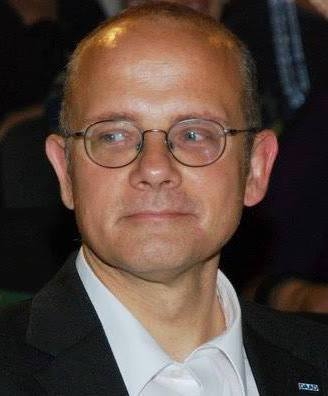For RT, embracing this stuff is a flip-flop. Or a flip within Russia's flop, since it would seem to contradict the official posture of the Russian regime. There can be no question but that, in its policy of spreading anti-American conspiracy theories, RT is not striking out on its own, but trying to act properly as an official state organ, reflecting what it understands to be the regime's wishes and interests. It matters not whether it comes up with the stories on its own, or with the help of guidance from above; either way, it is trying to fit in, the same way the other state controlled media do inside Russia when they propagate gutter-level anti-Americanism.
Yet the regime officially takes the opposite line on 9-11, even while it encourages this media behavior. The flips and flops are mixed up inside each other, like one of those convoluted contradictory Escher drawings.
It's the sort of thing that can leave a person topsy-turvy, wondering which way is up in Russia.
On the actual 9-11, in 2001, I had the good fortune to be in Moscow, not Washington. While my American friends were telling me of the terror in which they suddenly lived, the Russian Government was announcing its unequivocal support for America against the terrorists.
To be sure, the media in Russia were still talking anti-Americanism on 9-12-2001 -- particularly the predominant state controlled media. It was only the last major independent TV team, the one that Putin had been trying to drive out of business for more than a year, that supported Putin's pro-Western stance from the start. Perhaps Putin noticed the irony. The anti-media drive had been based on conspiracy theories: that the independent media were in league with the West, were destroying the Russian military, causing the sinking of the Kursk submarine, were agents who would lead the West to bomb Moscow the way it bombed Belgrade. For a time, faced with real enemies in the form of the terrorists, Putin slowed down his drive to destroy independent media. But he never reversed it; in due course he destroyed that one major remaining independent TV team. A couple years later, the paranoia about Western designs on Russia was revived in his comments on the Beslan terrorism incident, and immediately there ensued a sharper clampdown on autonomous political forces.
But let us go back to 9-11-2001. In those days even the state media and pundits, despite all their anti-Americanism, steered clear of extremism and conspiracy theories. For the most part they simply attacked America, honestly, for having fostered the Islamist extremism in Afghanistan during the fight against the Soviet occupation; and less honestly, said America created the Taliban for the sake of that fight (forgetting that the Taliban were formed in the mid-1990s, not the 1980s when the Soviets were around). It was only from nutty websites and ideological extremists in America that I came across anti-American conspiracy theories about 9-11. In Moscow, after a short but hard national debate -- and in face of some loss of realistic space for other approaches, as the global coalition supporting America against al Qaeda and the Taliban was taking shape, and some Caucasus and Central Asian states were moving to participate with or without Moscow's assent -- Putin's verbal support for America was translated into practical policies. Even the state media came over to the Western side.
Now, in 2009, it is the other way around. Americans are no longer living in daily terror. And official Russia is joining with the nutcases in America in spreading anti-American conspiracy theories.
To be sure, I did hear in the Moscow of 2001 one conspiracy theory about 9-11. It was that Putin did it -- he arranged to have America terrorized, by dummy Islamists. After all, how did it happen that Putin was the first leader in the world to think of picking up the phone and offering sympathy to President Bush? Was he tipped in advance?
(Note: You can view every article as one long page if you sign up as an Advocate Member, or higher).




